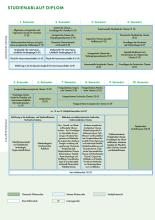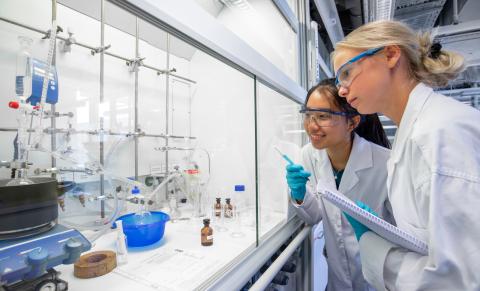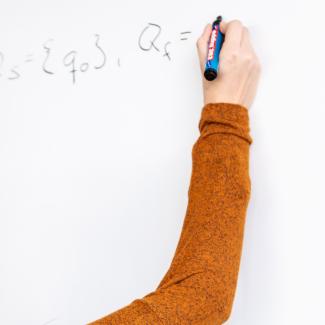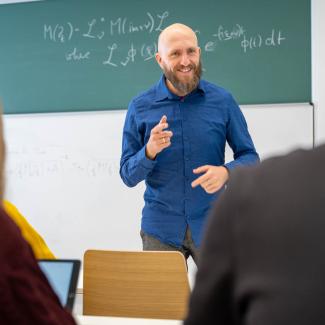Chemie
The chemistry degree program, which is unique in Germany, offers a particularly broad and research-oriented education. Here you will have the opportunity to combine different areas of chemistry even more than in the Bachelor's or Master's degree programmes.
Experimental lectures are an essential part of the degree program. The courses take place in comparatively small groups and practical problems are solved in teams. Online courses support individual learning. The proportion of laboratory practicals in the courses is very high at around 50 percent. There is a very good relationship between supervisors and students and there are no waiting times for the basic practicals. Particularly in the first semesters, you will receive individual support from professors, scientific and technical staff as well as students.
In the first four semesters, you will learn the most important fundamentals in physics and mathematics, inorganic, organic, physical, analytical, and technical chemistry, and acquire further general knowledge, including in the technical language of English. In complex oral examinations, you will show the professors that you have paid attention to the lectures, exercises, and practicals and that you can reproduce and apply your knowledge.
From the fifth semester onwards, you can decide for yourself which in-depth modules you would like to take and are thus introduced to the research work of the individual institutes. In the sixth semester, you will complete your dissertation. To do this, you will work on an interesting research topic, find out more about the subject, carry out experiments in the laboratory (or on the PC), and then present the results to the other members of the institute.
The traditional chemistry degree program can be supplemented by a wide range of electives according to your own interests, including modules on current topics such as "Energy Conversion and Storage" and "Organic Supramolecular Chemistry and Medicinal Chemistry". Modules such as "Environmental and Raw Materials Chemistry", "Semiconductor Chemistry", "Silicon Chemistry" or "Salt, Mineral, and Building Materials Chemistry" are not offered at any other Saxon university.
After a preparatory project study in the ninth semester, you complete your degree program with the degree examinations and a six-month thesis.
Find out more in our chemistry blog!
- Faculty
-
Faculty of Chemistry, Physics and Bioscience (Faculty 2)
- Degree
-
Diploma (Dipl.-Chem.)
- Standard period of study
-
10 Semester
- Part-time possible
-
Yes
- Start of studies
-
Winter semesterSummer semester
- Admission requirement
-
Abitur or subject-specific higher education entrance qualification or an entrance qualification recognized as equivalent.
Language requirement
- Application: with at least B1 level German
- Admission to the degree program: with C1 level German (e.g. DSH-2)
- language courses and DSH exam at TUBAF
- Prep Courses (Studienkolleg)
- Course language
-
German
- in the chemical industry: e.g. in research, production development and application technology, process engineering, management, chemical analysis, environmental protection, marketing, patenting, public relations, and communication
- in companies: e.g. in the pharmaceutical, cosmetics, food, and agricultural industries, the automotive and transport sectors, the electrical, electronics, and building materials industries as well as companies involved in energy and raw materials extraction and recycling
- at universities and research institutes: e.g. universities, Fraunhofer Institutes, and Helmholtz Centres
- in the public sector: e.g. in federal, state, and local authorities as well as trade supervisory offices and patent offices
- .e.g. universities, Fraunhofer Institutes and Helmholtz Centres
- in the public sector: e.g. in federal, state, and local authorities as well as trade supervisory offices and patent offices
- as a freelance chemist
Why study chemistry at TUBAF?
Chemistry permeates everything. Every living being is a "chemical factory". Therefore, life is not possible without chemistry. Chemistry is therefore much more than just things that stink and bang. Chemistry will also contribute to less "stinking and banging" in the future, because only with chemistry can the great problems of mankind be solved. This requires a new generation of chemists who, for example, break new ground in sustainable chemistry, who rethink recycling, and develop efficient processes, new materials, and catalyzers in order to be able to live a life worth living in the future. The necessary training is available in Freiberg. Join us!
Best results in the CHE university ranking
Many TUBAF chemistry students took part in the CHE university ranking survey. And the results are impressive: In comparison with other universities throughout Germany, our Chemistry degree programs (Bachelor and Diplom) achieved top places in all categories! You can find the detailed results here.
The detailed results of the CHE ranking were published in the ZEIT study guide and can also be viewed online (at www.heystudium.de/ranking after prior registration and internally via WISO). Here you can find the corresponding news release from TUBAF.

Indicator | Mean value for the TUBAF | Mean value for all universities |
| General study situation | 4,4 | 3,8 |
| Study organization | 4,8 | 4,4 |
| Support during studies | 4,4 | 3,8 |
| Laboratory practicals | 4,7 | 4,0 |
| Scientific competencies | 4,5 | 4,2 |
| Methodological skills | 4,5 | 4,1 |
| Interdisciplinary skills | 4,1 | 3,7 |
Interests and skills you should bring with you
If you are creative, interested in science, like to try out new things, and want to know "what holds the world together at its core", then you've come to the right place! Added bonus: After a day in the lab, you don't have to go to the gym either...
What alumni say
"Small but mighty!"
If you are interested in a sustainable chemistry degree programme with excellently equipped internships, TU Bergakademie Freiberg is the right place for you.
When I chose Freiberg, I was particularly interested in the high student-teacher ratio, which is made possible by the relatively small number of students. This means that you don't have to wait for a semester, as is the case at large universities, to be able to take part in an internship. The reason for this is that around 50% of a chemistry degree programme consists of work placements and although there are enough places for everyone in the lecture theatre at large universities, there are not necessarily enough places for practical training in the laboratories. This also makes the degree programme very personal, as everyone knows everyone - from students to professors.
In addition, special emphasis is placed on teaching sustainable thinking and the conscious use of raw materials in some areas of the course. In combination with involvement in research from the 5th semester onwards, this enables students to act with foresight and awareness of the consequences in terms of environmentally friendly chemistry. Values that had already moved Clemens Winkler in 1886 when he discovered germanium here in Freiberg. In addition to germanium, indium was also discovered here in 1863. Both elements still play a special role in teaching and research today. I particularly remember the great experimental lectures on inorganic chemistry from the undergraduate programme."
"During my studies, I appreciated the modern laboratories and the very good supervisor:student ratio."
Current insights into studying can be found on the social media channels of the Faculty of Chemistry and Physics on Instagram @tubaf_nat and TikTok @tubaf_nat










